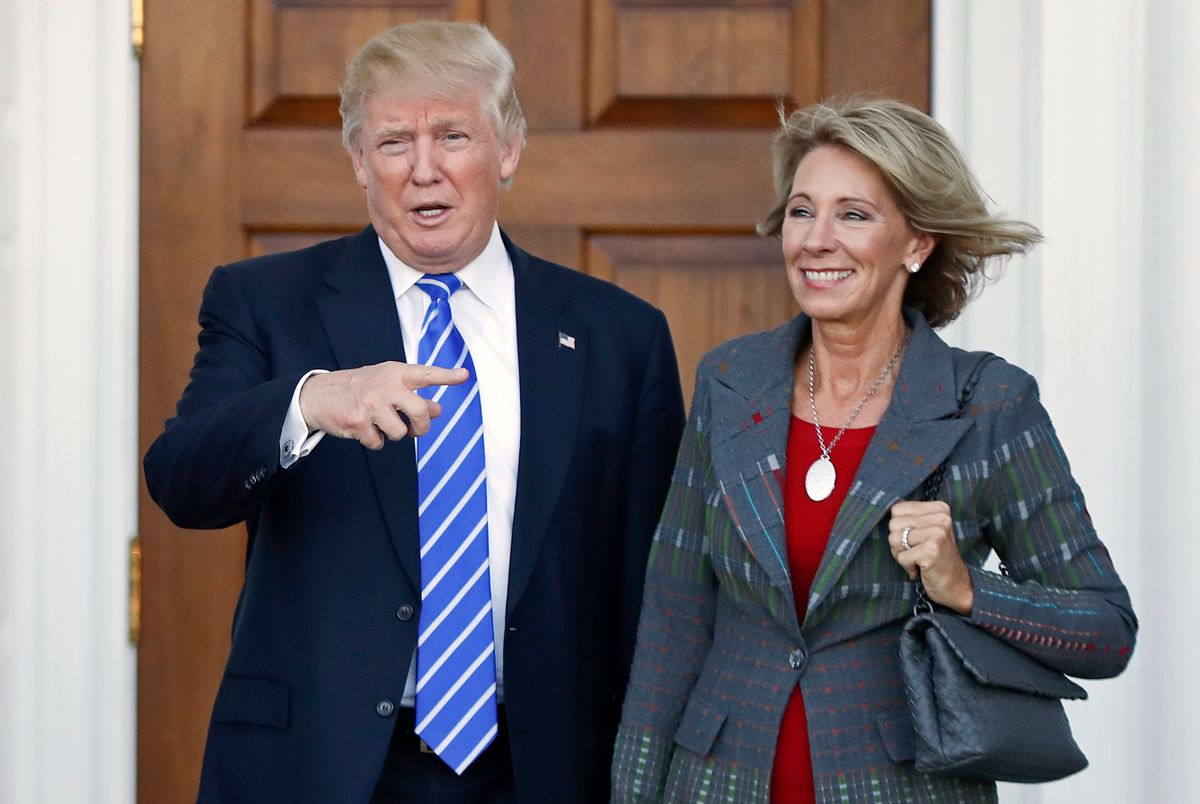The Democrats' last best chance for defeating a Trump cabinet nominee went down to defeat last Tuesday when Vice President Mike Pence cast the tiebreaking vote to approve the nomination of Michigan billionaire Betsy DeVos as Secretary of Education.
With Republican senators Susan Collins of Maine and Lisa Murkowski of Alaska on record as opposing DeVos’ nomination, the Democrats needed one more Republican vote to defeat DeVos, who is an advocate of channeling public education dollars to for-profit charter schools and vouchers for religious schools. But they fell short.
Even Arizona Republican Jeff Flake, a harsh critic of Trump during the 2016 campaign, supported DeVos. As Slate’s Jim Newell notes, no Republican senator was willing to serve as the target of the president’s dyspeptic Twitter blasts for the next two years.
Nonetheless, the success of DeVos’ opponents in peeling off Collins and Murkowski—and their failure to secure any others—holds lessons for the burgeoning opposition to the Trump administration, and not just in education policy.
Five lessons stand out.
1. Without Republican support, the anti-Trump movement cannot defeat the most extreme manifestation of Trumpism on Capitol Hill.
This is an obvious point, but one that is worth repeating. While nominations of retired general James Mattis and Exxon CEO Rex Tillerson were controversial, those men could fairly be described as competent to run the Defense and State Departments respectively. DeVos, who has never attended or enrolled her children in a public school, does not even pass that minimal test. Yet she was confirmed.
The opposition to Trump needs a message that a decisive number Republican lawmakers can run on and publicly defend. The opposition to DeVos approached, but did not quite succeed in crafting such a message.
2. The message of the anti-DeVos movement was broader than the center-left of the Democratic Party, and its message wasn’t particularly tied to Trump.
As Emma Brown of the Washington Post put it, DeVos’ nomination was imperiled by a "popular uprising" that was broader than partisan opposition to the choice of a Republican president.
DeVos' opponents were politically diverse. DeVos was opposed by the two big teachers' unions. But she was also opposed by Democrats for Education Reform, a group that has criticized the teachers' unions. She was opposed by the American Association for People With Disabilities as well as hundreds of graduates of Calvin College, a Christian school in Michigan where DeVos received her degree.
3. The message that prevailed in Alaska was non-partisan and targeted the senator's local offices, not Washington, D.C.
"She has no experience with public schools, that's number one," said Becca Bernard, a member of Great Alaska Schools, a nonpartisan coalition that advocates for public education and helped stage a protest of 200 people at Murkowski’s office in Anchorage.
The director of Murkowski’s state office told Alaska Dispatch News that the campaign against DeVos marked the first time he's seen outside campaigns encouraging people to call the senator’s local offices. “One of our state offices guessed they received over 150 calls in one day, and all but a couple were from out of state," he said.
4. Republican opposition to Trump may be more symbolic than substantive.
Collins and Murkowski could have killed DeVos' nomination by voting against her in committee and chose not to do so. The rewards of making a show of opposing Trump were balanced by the benefits of not killing his most controversial nomination.
To put it another way, the opposition to Trump needs to demonstrate the substantive rewards of bucking the party line. This has yet to happen.
5. Money doesn’t always talk.
The overwhelming and corrupting influence of money in politics has only gotten worse since the Supreme Court's judicial activism in the Citizens United case. But the influence of money is not always decisive. Murkowski has received $26,200 and Collins $5,000 from the DeVos family, according to OpenSecrets.org. The money did not buy their votes. The Republican senators had interests that mattered more than the money.
These lessons are relevant as the opposition to Trump is now burgeoning beyond the electoral coalition that opposed him during the campaign. Trump is far more unpopular than his Republican predecessor George W. Bush and the opposition is growing far beyond the left-liberal communities.
The legal struggle over Trump's travel ban has been joined by a phalanx of national security officials who pride themselves on bipartisanship and more than 100 technology companies that are loathe to get involved in politics lest they offend some part of their customer base. A high-tech company protest is planned for March 14 (Pi Day) and a scientists' march on Washington scheduled for April 22.
The ideological and social breadth of the anti-Trump movement is impressive, ranging from the radical and liberal left to the Democratic office holders (whose collective spine has been stiffened thanks to the huge numbers that turned out for the women’s march) to centrist political elites in Washington to the #NeverTrump movement of the right, exemplified by independent presidential candidate (and former CIA agent) Evan McMullin and former Bush speechwriter David Frum.
What unites these disparate movements is the conviction that Trump is unfit for office and is building an American autocracy. What divides these movements are political history, orientation and prescriptions for the most effective way to defeat Trumpism.
The movement that came to the brink of defeating Betsy DeVos harnessed political diversity in the service of a concrete political goal: a Senate confirmation vote. Whether such unity can be forged and amplified in the anti-Trump struggles to come is an open question.




Shares